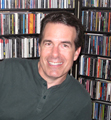5 Tips for New Authors: Q&A with Jason Warburg
 Jason Warburg, editor of music-review site The Daily Vault and author of the just-published novel Believe in Me, shares the trials and tribulations of producing a successful debut novel — and provides some useful info for new authors everywhere.
Jason Warburg, editor of music-review site The Daily Vault and author of the just-published novel Believe in Me, shares the trials and tribulations of producing a successful debut novel — and provides some useful info for new authors everywhere.
As evidenced by the worn notebooks discarded in coffeeshops or banished to storage lockers (or, yes, set aflame), the fortitude required to produce a first book — the planning, the execution, the discipline — is enough to drive budding scribes to sunnier climes. But just absorbing a few simple thoughts before sitting down to write can make all the difference when the going gets tough. Just ask Jason.
*
1. Believe in Me is packed with musical references. How important were “the little things” — the arcane details — to the story?
 I think they were pretty important. Like any distinct segment of society, the music world has its own lingo, history, and social conventions. The details provide that extra layer of texture that hopefully helps to give the narrative authenticity. But they were more than just stage dressing. As a bit of a musicologist myself, I’m passionate about those details — the memorable lyrics and musical moments that have been a part of the texture of my own life. My hope/ambition was that my passion for those details would feed into the characters’ behavior, and that their intense engagement with the world they were living in would make the story that much more compelling.
I think they were pretty important. Like any distinct segment of society, the music world has its own lingo, history, and social conventions. The details provide that extra layer of texture that hopefully helps to give the narrative authenticity. But they were more than just stage dressing. As a bit of a musicologist myself, I’m passionate about those details — the memorable lyrics and musical moments that have been a part of the texture of my own life. My hope/ambition was that my passion for those details would feed into the characters’ behavior, and that their intense engagement with the world they were living in would make the story that much more compelling.
Those little details might be a bit less important for a different kind of story than Believe in Me, but I think that anything that contributes to the creation of a fully-realized, three-dimensional universe for the reader to step into is going to make your story a better story.
2. You’ve been writing about music for a long time. This is your first foray into fiction. Does an author need to “write what they know”?
Yes and no. Our own experience is always a safe harbor from which to begin the journey of writing a novel. Taking the need to do a lot of extra research out of the equation tends to make the task feel more achievable. And one of the joys of reading fiction for me personally is being introduced to ideas and settings that I’m not familiar with; if you have a particular expertise or unique set of experiences that others might find intriguing, that can become a compelling setting for, or element of, your story.
That said, if you’re just writing your own story, it’s not really fiction, is it? It’s just an idealized version of your own life, in which you get to revise and extend your remarks and make things turn out the way you wish they had. And life tends not to deliver clean, clear story arcs of the kind that make for compelling novels; real life is messier than that. So, while the author’s own experience and expertise can definitely form a foundation for fiction, I think that to write engaging characters you have to get outside yourself and fully inhabit new personas that see and feel the world differently than you do. In my experience, that’s where the real “juice” — the unexpected insights and twists that you hadn’t necessarily planned on — come from. Once you’re able to get outside your own head, the characters come to life and sometimes even start to dictate the story to you.
3. Is it important for an author to “begin with the end in mind”? Or is writing a book necessarily a process of discovery, with the end unknown?
It depends on your personality type. No, seriously. I have read about plenty of authors — including one of my favorites, Robert B. Parker — who claim they never outline their stories ahead of time, and in Parker’s case, never revise. They just write, and keep going until they finish.
I feel about that approach roughly the way I feel about bungee jumping, as in, no way, no how. I simply can’t function that way; I need more preparation and control. I’m taking pretty much the same approach to the novel I’m currently working on as I did with Believe in Me. I start with a core set of characters in mind — not set in stone, but sketched out in my mind so that I have some idea how they would probably interact. And I start with a basic story arc: they start out here, two or three or four key events take place along the way, and they end up roughly there. Those events and the final destinations of the various characters are likely to change somewhat along the way — you have to let the story and characters dictate those outcomes rather than forcing things — but for me, I need to have a basic shape and arc for the story in mind before I start. I’ll leave the analysis of why that is to the amateur shrinks out there… I just know what works for me.
4. How do you know when a book is finished? At what point do you know it can and will make a meaningful impact on the reader?
This is a really hard one. It’s easy to just keep revising and revising and revising… I can always find something I think could be better, even now, after publication. For me, I need to do at least one thorough review/rewrite after I’ve had some time away from finishing a story. There are always things I missed, either opportunities to add telling details, or pieces that, on reflection, didn’t fit together quite as well as I’d hoped. I also often find bits that in retrospect feel like I either over- or undersold along the way, that need recalibrating once I have the perspective that you can only get by finishing and stepping away. I just can’t get that reader’s perspective when I’m fully immersed in writing the story.
I think there are two ways to tell when you’re finished. Scientifically speaking, when you hit the 90-10 point — where 90% or more of your read-through is just reading and less than 10% is actual editing — you’re probably done. Emotionally, I think it’s when you reach the point of accepting that your story for what it is, and recognizing that your “writing” has devolved into tinkering. Tinkering rarely improves a story; it just prolongs the birthing process for the parent.
5. What advice do you have for the aspiring writer with the “manuscript in the drawer”? How important is it to share the work with an audience?
I think this is another question whose answer really varies from person to person and manuscript to manuscript. The real question is why — why is that manuscript still in the drawer? Is the issue confidence in the product? Fear of revealing too much of oneself? Shyness about promoting your own work to agents/publishers/the public? If it’s confidence in the product, have three or four people whose judgment and honesty you trust read it over and give you feedback, and then improve it if you can (or stick to your guns, and believe in what you wrote). If the issue is either of the latter, then you need to ask yourself why you wrote the manuscript in the first place. What was the purpose or goal behind that effort? Maybe your purpose was not to be published, but to either exercise muscles or exorcise demons. Either is a perfectly legitimate pursuit. You are the author; you are in charge.
I actually have a manuscript in the drawer at home that fell into the “exorcising demons” category. Once it was done, it was more important to move on than to share it with an audience. The next project I began working on after that was Believe in Me. From the very beginning, this was a novel intended for an audience, and the reality that it’s out there now and in the process of finding an audience is tremendously fulfilling for me.
[subscribe2]

A terrific interview. Thorough responses, Jason. Don’t you find that a writer’s first novel (whether it has been published or is sitting in a drawer) is typically his/her most autobiographical?
Hi Richard — Thanks for the feedback. I do think what you’re saying is often true, and I’ve got one of those in the trunk. It makes sense that a writer would begin with a story that reflects something that they feel an urgent need to express.